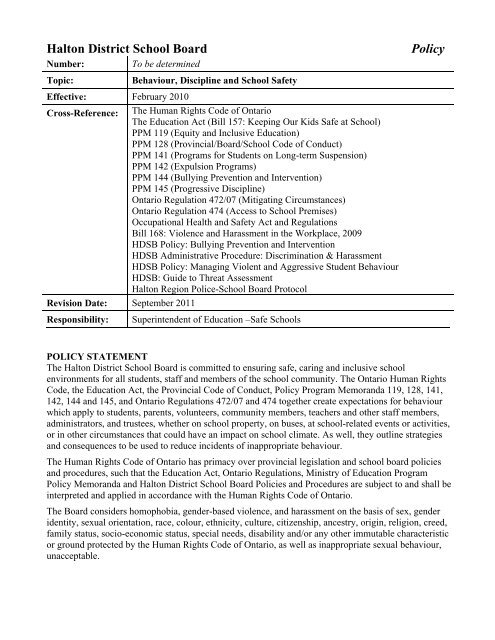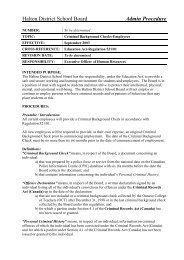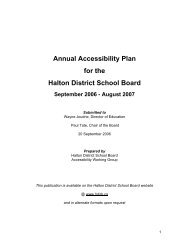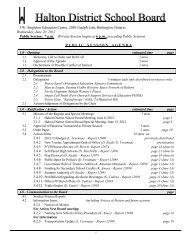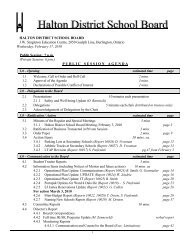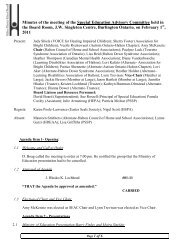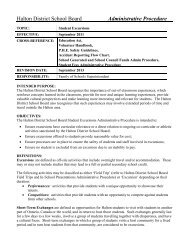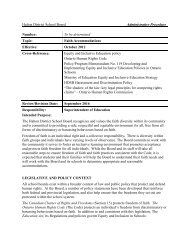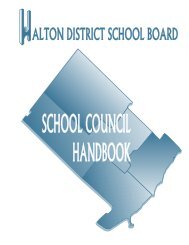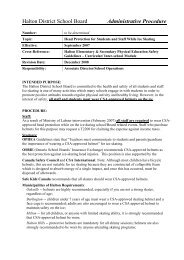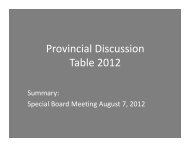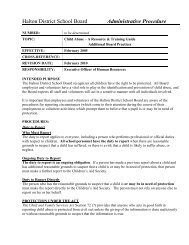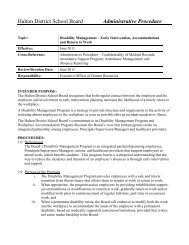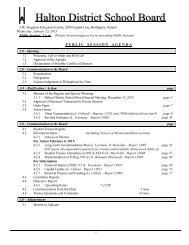Discipline and Safety of Students - Halton District School Board
Discipline and Safety of Students - Halton District School Board
Discipline and Safety of Students - Halton District School Board
Create successful ePaper yourself
Turn your PDF publications into a flip-book with our unique Google optimized e-Paper software.
<strong>Halton</strong> <strong>District</strong> <strong>School</strong> <strong>Board</strong><br />
Number:<br />
To be determined<br />
Policy<br />
Topic:<br />
Behaviour, <strong>Discipline</strong> <strong>and</strong> <strong>School</strong> <strong>Safety</strong><br />
Effective: February 2010<br />
Cross-Reference: The Human Rights Code <strong>of</strong> Ontario<br />
The Education Act (Bill 157: Keeping Our Kids Safe at <strong>School</strong>)<br />
PPM 119 (Equity <strong>and</strong> Inclusive Education)<br />
PPM 128 (Provincial/<strong>Board</strong>/<strong>School</strong> Code <strong>of</strong> Conduct)<br />
PPM 141 (Programs for <strong>Students</strong> on Long-term Suspension)<br />
PPM 142 (Expulsion Programs)<br />
PPM 144 (Bullying Prevention <strong>and</strong> Intervention)<br />
PPM 145 (Progressive <strong>Discipline</strong>)<br />
Ontario Regulation 472/07 (Mitigating Circumstances)<br />
Ontario Regulation 474 (Access to <strong>School</strong> Premises)<br />
Occupational Health <strong>and</strong> <strong>Safety</strong> Act <strong>and</strong> Regulations<br />
Bill 168: Violence <strong>and</strong> Harassment in the Workplace, 2009<br />
HDSB Policy: Bullying Prevention <strong>and</strong> Intervention<br />
HDSB Administrative Procedure: Discrimination & Harassment<br />
HDSB Policy: Managing Violent <strong>and</strong> Aggressive Student Behaviour<br />
HDSB: Guide to Threat Assessment<br />
<strong>Halton</strong> Region Police-<strong>School</strong> <strong>Board</strong> Protocol<br />
Revision Date: September 2011<br />
Responsibility:<br />
Superintendent <strong>of</strong> Education –Safe <strong>School</strong>s<br />
POLICY STATEMENT<br />
The <strong>Halton</strong> <strong>District</strong> <strong>School</strong> <strong>Board</strong> is committed to ensuring safe, caring <strong>and</strong> inclusive school<br />
environments for all students, staff <strong>and</strong> members <strong>of</strong> the school community. The Ontario Human Rights<br />
Code, the Education Act, the Provincial Code <strong>of</strong> Conduct, Policy Program Memor<strong>and</strong>a 119, 128, 141,<br />
142, 144 <strong>and</strong> 145, <strong>and</strong> Ontario Regulations 472/07 <strong>and</strong> 474 together create expectations for behaviour<br />
which apply to students, parents, volunteers, community members, teachers <strong>and</strong> other staff members,<br />
administrators, <strong>and</strong> trustees, whether on school property, on buses, at school-related events or activities,<br />
or in other circumstances that could have an impact on school climate. As well, they outline strategies<br />
<strong>and</strong> consequences to be used to reduce incidents <strong>of</strong> inappropriate behaviour.<br />
The Human Rights Code <strong>of</strong> Ontario has primacy over provincial legislation <strong>and</strong> school board policies<br />
<strong>and</strong> procedures, such that the Education Act, Ontario Regulations, Ministry <strong>of</strong> Education Program<br />
Policy Memor<strong>and</strong>a <strong>and</strong> <strong>Halton</strong> <strong>District</strong> <strong>School</strong> <strong>Board</strong> Policies <strong>and</strong> Procedures are subject to <strong>and</strong> shall be<br />
interpreted <strong>and</strong> applied in accordance with the Human Rights Code <strong>of</strong> Ontario.<br />
The <strong>Board</strong> considers homophobia, gender-based violence, <strong>and</strong> harassment on the basis <strong>of</strong> sex, gender<br />
identity, sexual orientation, race, colour, ethnicity, culture, citizenship, ancestry, origin, religion, creed,<br />
family status, socio-economic status, special needs, disability <strong>and</strong>/or any other immutable characteristic<br />
or ground protected by the Human Rights Code <strong>of</strong> Ontario, as well as inappropriate sexual behaviour,<br />
unacceptable.
Principal or Designate<br />
The <strong>Halton</strong> <strong>District</strong> <strong>School</strong> <strong>Board</strong> supports the Principal’s authority in the school <strong>and</strong> recognizes that<br />
Ministry policy permits the principal to delegate his/her powers under the Education Act Part XIII 300.1<br />
(1) in writing to a designate, namely a Vice Principal, or a teacher in the absence <strong>of</strong> Principal <strong>and</strong> Vice<br />
Principal. A teacher-in-charge shall not be delegated authority to suspend a pupil. See designate form –<br />
Appendix B.<br />
Superintendent <strong>of</strong> Education Responsible for Student <strong>Discipline</strong><br />
The <strong>Halton</strong> <strong>District</strong> <strong>School</strong> <strong>Board</strong> authorizes the assignment <strong>of</strong> responsibility for student discipline to a<br />
Superintendent <strong>of</strong> Education as per the Education Act Part XIII 309(2). The designated Superintendent<br />
shall be called ‘Superintendent <strong>of</strong> Education – Safe <strong>School</strong>s’.<br />
<strong>Discipline</strong> Committee<br />
The <strong>Halton</strong> <strong>District</strong> <strong>School</strong> <strong>Board</strong> authorizes the creation <strong>of</strong> a <strong>Discipline</strong> Committee <strong>of</strong> no fewer than<br />
three (3) Trustees to decide upon principal recommendation for expulsion, <strong>and</strong> to hear appeals <strong>of</strong><br />
principal suspensions. The <strong>Discipline</strong> Committee shall have the powers as set out in the Education Act<br />
<strong>and</strong> any other powers necessary <strong>and</strong> shall consider the Human Rights Code <strong>of</strong> Ontario prior to<br />
implementing any appropriate order.<br />
Mitigating <strong>and</strong> Other Factors<br />
The <strong>Halton</strong> <strong>District</strong> <strong>School</strong> <strong>Board</strong>, <strong>and</strong> school administrators, must consider all mitigating <strong>and</strong> other<br />
factors, as required by the Education Act, set out in Ontario Regulation 472/07 <strong>and</strong> reflected in student<br />
discipline settlements with the Ontario Human Rights Commission. For students with special education<br />
<strong>and</strong>/or disability related needs, interventions, supports <strong>and</strong> consequences must be consistent with the<br />
expectations in the student’s Individual Education Plan (IEP) <strong>and</strong>/or his/her demonstrated abilities.<br />
Before applying discipline, the discriminatory impacts <strong>of</strong> disciplinary decisions on students protected by<br />
the Human Rights Code <strong>of</strong> Ontario shall be considered.<br />
The Mitigating Factors to be considered are:<br />
1. Whether the student has the ability to control his or her behaviour;<br />
2. Whether the student has the ability to underst<strong>and</strong> the foreseeable consequences <strong>of</strong> his/her behaviour;<br />
3. Whether the student’s continuing presence in the school does or does not create an unacceptable risk<br />
to the safety <strong>of</strong> any person at the school.<br />
Other Factors to be considered are:<br />
1. The student’s academic, discipline <strong>and</strong> personal history;<br />
2. Whether a progressive discipline approach has been attempted with the student, <strong>and</strong> if so, the<br />
progressive discipline approach(es) that has/have been attempted <strong>and</strong> any success or failure;<br />
3. Whether the infraction for which the student might be disciplined was related to any harassment <strong>of</strong><br />
the student because <strong>of</strong> race, colour, ethnic origin, place <strong>of</strong> origin, religion, creed, disability, gender<br />
or gender identity, sexual orientation or harassment for any other reason;<br />
4. The impact <strong>of</strong> the discipline on the student’s prospects for further education;<br />
5. The student’s age;<br />
6. Where the student has an individual education plan (I.E.P.) or disability-related needs:<br />
a. whether the behaviour causing the incident was a manifestation <strong>of</strong> the student’s disability;<br />
b. whether appropriate individualized accommodation has been provided, <strong>and</strong><br />
c. whether a suspension is likely to result in a greater likelihood <strong>of</strong> further inappropriate<br />
conduct;<br />
Whether or not the student’s continuing presence at school creates an unacceptable risk to the safety <strong>of</strong><br />
anyone in the school.
Exclusion<br />
The <strong>Board</strong> does not support the use <strong>of</strong> exclusion as a disciplinary measure. However, the Education Act<br />
Part X, 265 (1)(m) permits a principal, or delegate, to refuse to admit to the school or to a class, someone<br />
whose presence in the school or classroom would, in the principals judgment, be detrimental to the<br />
physical or mental well being <strong>of</strong> others. If the principal, or delegate, does decide that it is necessary to<br />
exclude a student from school, s/he is expected to notify the student’s parents <strong>of</strong> the exclusion as soon as<br />
possible in the circumstances, <strong>and</strong> to inform them <strong>of</strong> their right to appeal under clause 265.(1)(m).<br />
Exclusion from school should be temporary <strong>and</strong> for the purpose <strong>of</strong> putting in place a plan to promote the<br />
student’s inclusion while supporting the safety <strong>of</strong> others.<br />
Prevention <strong>and</strong> Proactive Practices<br />
The <strong>Halton</strong> <strong>District</strong> <strong>School</strong> <strong>Board</strong> supports the use <strong>of</strong> positive practices to prevent inappropriate<br />
behaviour, <strong>and</strong> authorizes principals, or their delegates, to impose consequences in appropriate<br />
circumstances, up to <strong>and</strong> including a referral to the <strong>Discipline</strong> Committee <strong>of</strong> the <strong>Board</strong> for expulsion.<br />
The <strong>Board</strong> also encourages principals to review <strong>and</strong> amend, as appropriate, Individual Education Plans,<br />
Behaviour Management Plans <strong>and</strong> <strong>Safety</strong> Plans at regular intervals, <strong>and</strong> following an incident, to ensure<br />
that every student with disability-related needs is receiving appropriate accommodation.<br />
Preventative practices include:<br />
• Ontario Equity <strong>and</strong> Inclusive Education<br />
Strategy pursuant to PPM 119;<br />
• <strong>School</strong>-based <strong>Safety</strong> & Wellbeing teams;<br />
• Bullying prevention <strong>and</strong> violence<br />
prevention programs;<br />
• Mentorship programs;<br />
• Differentiated instruction;<br />
• Student success strategies;<br />
• Healthy lifestyles;<br />
• <strong>School</strong> culture initiatives;<br />
• Character <strong>and</strong> citizenship development;<br />
• Student leadership;<br />
• Promoting healthy student relationships<br />
Positive behaviour management practices include:<br />
• Program modifications or accommodations;<br />
• Class placement;<br />
• Behaviour management plans;<br />
• Positive encouragement <strong>and</strong> reinforcement;<br />
• Individual, peer <strong>and</strong> group counseling;<br />
• Conflict/dispute resolution;<br />
• Collaborative Problem Solving;<br />
• Promotion <strong>of</strong> healthy student relationships;<br />
• Mentorship programs;<br />
• Restorative practices;<br />
• Sensitivity programs;<br />
• <strong>Safety</strong> plans;<br />
• <strong>School</strong>, <strong>Board</strong> <strong>and</strong> community support<br />
programs; <strong>and</strong><br />
• Student success strategies.<br />
Progressive <strong>Discipline</strong><br />
The <strong>Halton</strong> <strong>District</strong> <strong>School</strong> <strong>Board</strong> supports the use <strong>of</strong> a progressive discipline approach that utilizes a<br />
continuum <strong>of</strong> interventions, supports <strong>and</strong> consequences that are developmentally appropriate to address<br />
inappropriate behaviours, <strong>and</strong> builds upon strategies that promote positive school climate. Intervention<br />
strategies range from early interventions to more intensive interventions, including suspension <strong>and</strong><br />
expulsion <strong>and</strong> involvement <strong>of</strong> police. <strong>Discipline</strong> should be applied within a framework that shifts the<br />
focus from one that is solely punitive to one that is both corrective <strong>and</strong> supportive, <strong>and</strong> that includes<br />
learning opportunities for reinforcing positive behaviour. All schools must develop <strong>and</strong> implement a<br />
progressive discipline policy that is consistent with <strong>Board</strong> policy <strong>and</strong> PPM 145.
Progressive discipline may include early <strong>and</strong>/or ongoing intervention strategies, such as:<br />
• Reminders/review <strong>of</strong> expectations (including<br />
Code <strong>of</strong> Conduct);<br />
• Contact with the student’s<br />
parent(s)/guardian(s);<br />
• Work assignment with a learning component;<br />
• Volunteer service to the school/community;<br />
• Peer mentoring<br />
• Conflict mediation <strong>and</strong> resolution;<br />
• Collaborative Problem Solving;<br />
• Consultation;<br />
• Involvement <strong>of</strong> police (school liaison or<br />
D.A.R.E. <strong>of</strong>ficer) or probation <strong>and</strong> parole as<br />
appropriate;<br />
• Referral to counseling.<br />
Progressive discipline may also include a range <strong>of</strong> interventions, supports <strong>and</strong> consequences with a<br />
focus on improving behaviour, such as one or more <strong>of</strong> the following:<br />
• Referral to a community agency for anger<br />
management, substance abuse, or other;<br />
• Detention;<br />
• Withdrawal <strong>of</strong> privileges;<br />
• Withdrawal from class;<br />
• Meeting with the student’s parent(s) /<br />
guardian(s), teacher(s), support staff<br />
(student as appropriate);<br />
• Restitution for damages;<br />
• Restorative practices;<br />
• Transfer;<br />
• Involvement <strong>of</strong> police (school liaison or<br />
DARE <strong>of</strong>ficer) <strong>and</strong>/probation <strong>and</strong> parole as<br />
appropriate.<br />
The <strong>Halton</strong> <strong>District</strong> <strong>School</strong> <strong>Board</strong> recognizes that in some circumstances, positive practices may not be<br />
sufficient to address inappropriate student behaviour. In such circumstances, the <strong>Board</strong> supports the<br />
use <strong>of</strong> consequences, including suspension <strong>and</strong> expulsion. In circumstances where a student will<br />
receive a consequence, the <strong>Board</strong> <strong>and</strong> school administrators must consider mitigating <strong>and</strong> other factors,<br />
as required by the Education Act <strong>and</strong> as set out in Ontario Regulation 472/07.<br />
Duty to Respond – All Staff Who Work Directly with <strong>Students</strong><br />
The <strong>Halton</strong> <strong>District</strong> <strong>School</strong> <strong>Board</strong> expects all employees who work directly with students – including<br />
administrators, teachers <strong>and</strong> non-teaching staff (including staff in social work, child <strong>and</strong> youth work,<br />
psychology <strong>and</strong> related areas, <strong>and</strong> educational assistants) – to respond to any student behaviour that is<br />
likely to have a negative impact on the school climate. Such behaviour includes all inappropriate <strong>and</strong><br />
disrespectful behaviour at any time at school <strong>and</strong> at any school-related event if, in the employee’s<br />
opinion, it is safe to respond to it. These behaviours include racist, sexist, or homophobic comments,<br />
slurs, <strong>and</strong> jokes <strong>and</strong> graffiti, as well as activities for which suspension or expulsion may be considered.<br />
The <strong>Board</strong> expects that the response provided for students with known special needs will be consistent<br />
with the student’s strengths, needs, goals <strong>and</strong> expectations contained in the IEP. The response required<br />
for students in alternative education should be as per direction <strong>of</strong> the Principal.<br />
Duty to Report – All <strong>Halton</strong> <strong>District</strong> <strong>School</strong> <strong>Board</strong> Employees <strong>and</strong> Transportation Providers<br />
The <strong>Halton</strong> <strong>District</strong> <strong>School</strong> <strong>Board</strong> requires any employee <strong>of</strong> the <strong>Board</strong>, <strong>and</strong>/or transportation provider,<br />
who becomes aware that a student at a school <strong>of</strong> the board may have engaged in an activity for which<br />
suspension or expulsion must be considered shall report the matter to the Principal, or designate, as<br />
soon as reasonably possible. The employee/transportation provider must consider the safety <strong>of</strong> others<br />
<strong>and</strong> the urgency <strong>of</strong> the situation in reporting the incident, but in any case, must report it to the principal<br />
no later than the end <strong>of</strong> the school day, or end <strong>of</strong> the transportation route. In cases where an immediate<br />
action is required, a verbal report to the principal may be made. A written report must be made when it<br />
is safe to do so using the Safe <strong>School</strong>s Incident Reporting Form (Appendix A).
The <strong>Halton</strong> <strong>District</strong> <strong>School</strong> <strong>Board</strong> expects all employees, <strong>and</strong> transportation providers, to take into<br />
consideration any mitigating or other circumstances which may explain the behaviour before deciding<br />
whether or not to report the behaviour for students with known special needs, or students who require<br />
alternative education as per direction <strong>of</strong> the Principal. The duty to report <strong>and</strong> subsequent filling out <strong>of</strong><br />
the Safe <strong>School</strong>s Incident Report Form would not be necessary or appropriate for an incident involving<br />
a student with known special needs, or where mitigating circumstances are known. These incidents still<br />
require appropriate follow up by the employee/transportation provider with notice to the principal, <strong>and</strong><br />
completion <strong>of</strong> Employee Incident Reports if a safety risk to the employee occurs.<br />
Incident Reporting Forms – Maintaining Records<br />
When a Safe <strong>School</strong>s Incident Reporting Form is provided by an employee/transportation provider, the<br />
principal will complete Part II Acknowledgement <strong>of</strong> Receipt <strong>of</strong> Report, make a copy <strong>of</strong> page one, <strong>and</strong><br />
redact the student’s name on the copy <strong>and</strong> return the copy to the staff member/transportation provider<br />
who completed the report.<br />
Forms are to be numbered <strong>and</strong> kept in the <strong>of</strong>fice binder for the balance <strong>of</strong> the school year <strong>and</strong> the<br />
following school year, unless the copy is removed from the OSR. Where suspension or expulsion<br />
applies, a copy <strong>of</strong> the Safe <strong>School</strong> Incident Reporting Form bearing the same number as the original in<br />
the <strong>of</strong>fice binder, with the name <strong>of</strong> the reporting person redacted, will be placed in the student’s OSR<br />
attached to the suspension/expulsion letter. The information relating to suspension for violent<br />
behaviour (police involved <strong>and</strong> Violent Incident Report completed <strong>and</strong> attached) shall not be removed<br />
from the OSR unless three consecutive years have passed during which no further suspensions for<br />
serious violent incidents have taken place. The information related to expulsion may be removed five<br />
years after the date on which the school board expelled the student. These letters <strong>and</strong> forms are<br />
confidential <strong>and</strong> subject to MFIPPA.<br />
Principal (or designate) Notification to Parents <strong>of</strong> <strong>Students</strong> Who May Have Been Harmed<br />
The <strong>Halton</strong> <strong>District</strong> <strong>School</strong> <strong>Board</strong> expects that, if the principal, or designate, believes that a student has<br />
been harmed as a result <strong>of</strong> an activity for which suspension or expulsion may be considered, the<br />
principal, or designate, must contact the parent/guardian <strong>of</strong> a student<br />
• who is less than 18 years <strong>of</strong> age;<br />
• who is 18 years <strong>of</strong> age or older <strong>and</strong> consents to such contact;<br />
• who is 16 or 17 <strong>and</strong> withdrawn from parental control, <strong>and</strong> consents to such contact; except where,<br />
in the opinion <strong>of</strong> the principal, informing the parent/guardian would put the student at risk <strong>of</strong> harm<br />
<strong>and</strong> would not be in the student’s bests interests; in this case the principal or designate is required<br />
to document their decision <strong>and</strong> the rationale for same.<br />
The principal, or designate, shall disclose<br />
• the nature <strong>of</strong> the activity that resulted in harm to the student;<br />
• the nature <strong>of</strong> the harm to the student; <strong>and</strong><br />
• the steps taken to protect the student’s safety.<br />
As per MFIPA (Municipal Freedom <strong>of</strong> Information <strong>and</strong> Protection <strong>of</strong> Privacy Act), the principal, or<br />
designate shall not disclose the name or any other identifying or personal information about a pupil<br />
who engaged in the activity that resulted in the harm, but may inform the parent/guardian <strong>of</strong> the victim<br />
that<br />
“Disciplinary action has been taken within the scope <strong>of</strong> progressive discipline as prescribed<br />
in legislation <strong>and</strong> <strong>Board</strong> policy”<br />
as follows:
• that the matter has been dealt with appropriately by the school;<br />
• as to whether police have been notified, but may not disclose whether or not charges have been laid;<br />
• if the student who engaged in the activity that resulted in the harm will not be returning to school;<br />
• what, if any, steps are being taken to ensure the safety <strong>of</strong> other students;<br />
• what supports are available for students who are victims <strong>of</strong> bullying or other harm.<br />
Victims <strong>of</strong> Serious Incidents<br />
The <strong>Board</strong> supports students who are victims <strong>of</strong> serious incidents <strong>of</strong> student behaviour causing harm<br />
contrary to the provincial, <strong>Board</strong>, <strong>and</strong> school Code <strong>of</strong> Conduct. The principal, or designate, will<br />
provide information to parent/guardian(s) <strong>of</strong> victims <strong>and</strong>/or refer to a <strong>School</strong> Social Workers, Child<br />
Youth Counselor, or <strong>Safety</strong> <strong>and</strong> Wellbeing staff member who may be helpful in ensuring supports for<br />
victims as needed. Contact information <strong>and</strong> referrals to appropriate community agencies <strong>and</strong> services<br />
to address the needs <strong>of</strong> victims <strong>and</strong> their families are to be facilitated. Information on services may also<br />
be found at<br />
http://www.hdsb.ca/CommunityResources/Pages/CommunityContactforSupportServices.aspx<br />
Parents/guardians <strong>of</strong> victims who are dissatisfied with steps taken to provide support to the victim may<br />
bring their dissatisfaction to the attention <strong>of</strong> the principal. The parents/guardians may contact the<br />
Superintendent <strong>of</strong> Education responsible for the school if they continue to be dissatisfied after speaking<br />
with the principal.<br />
SUSPENSION <strong>and</strong>/or EXPULSION<br />
The <strong>Board</strong> supports the use <strong>of</strong> suspension <strong>and</strong> expulsion where a student has engaged in one or more<br />
<strong>of</strong> the activities outlined in the Education Act under Part XIII Sections 306(1) <strong>and</strong> 310(1) <strong>and</strong> in <strong>Board</strong><br />
Policy, on school property, during a school-related activity or event (on or <strong>of</strong>f schools property),<br />
<strong>and</strong>/or in circumstances where the activity (on or <strong>of</strong>f school property) has an impact on the school<br />
climate. In all cases where consequences may be imposed, teachers, administrators <strong>and</strong> the <strong>Board</strong> will<br />
consider the safety <strong>and</strong> dignity <strong>of</strong> all students, <strong>and</strong> the impact <strong>of</strong> the activity on the school climate. The<br />
principal <strong>and</strong>/or <strong>Discipline</strong> Committee <strong>of</strong> the <strong>Board</strong> shall consider whether or not the discipline will<br />
have a disproportionate impact on a student protected by the Human Rights Code <strong>and</strong>/or exacerbate the<br />
student’s disadvantaged position in society.<br />
Principal Investigation<br />
Before determining appropriate supports <strong>and</strong>/or consequences, the principal, or designate, must<br />
complete an investigation consistent with the expectations <strong>of</strong> the Human Rights Code <strong>and</strong> as required<br />
by the Education Act, which is consistent with the expectations for principal investigations <strong>and</strong> must<br />
take into consideration any mitigating <strong>and</strong> other factors.<br />
Mitigating <strong>and</strong> Other Factors<br />
Before imposing a suspension, or a suspension pending an investigation to determine whether to<br />
recommend expulsion, the principal, or designate, must consider any mitigating <strong>and</strong> other factors <strong>and</strong><br />
their application for the purpose <strong>of</strong> mitigating the discipline to be imposed. For the purpose <strong>of</strong> the<br />
Student <strong>Discipline</strong> Policy <strong>and</strong> Procedures, the <strong>Board</strong> interprets the provisions <strong>of</strong> the Education Act <strong>and</strong><br />
Regulations in a broad <strong>and</strong> liberal manner consistent with the Human Rights Code. The principal or<br />
designate shall consider whether or not the discipline will have a disproportionate impact on a student<br />
protected by the Human Rights Code <strong>and</strong>/or exacerbate the student’s disadvantaged position in society.
If the principal imposes a suspension pending an investigation to determine whether to recommend<br />
expulsion, the Principal must consider any mitigating <strong>and</strong> other factors, as set out above <strong>and</strong> in the<br />
Student <strong>Discipline</strong> Procedures, for the purpose <strong>of</strong> mitigation when determining whether to recommend<br />
an expulsion from the student’s school or from all schools <strong>of</strong> the <strong>Board</strong>, as required by the Education<br />
Act. If the principal determines it is not appropriate to recommend an expulsion, the principal must<br />
consider mitigating <strong>and</strong> other factors in deciding whether to shorten the length <strong>of</strong> the suspension.<br />
SUSPENSION: Activities leading to possible suspension under the Education Act Section 306. (1)<br />
A principal shall consider whether to suspend a student if he or she believes that the student has engaged<br />
in any <strong>of</strong> the following activities while at school, at a school-related activity or in other circumstances<br />
where engaging in the activity will have an impact on the school climate:<br />
1. * Uttering (verbalizing, writing or sending) a threat to inflict serious bodily harm on another person.<br />
2. Possessing alcohol or illegal drugs.<br />
3. Being under the influence <strong>of</strong> alcohol.<br />
4. Swearing at a teacher or at another person in a position <strong>of</strong> authority.<br />
5. * Committing an act <strong>of</strong> v<strong>and</strong>alism that causes extensive damage to school property at the student’s<br />
school or to property located on the premises <strong>of</strong> the student’s school.<br />
6. Bullying.<br />
Any other activity that is an activity for which a principal may suspend a student under a policy <strong>of</strong> the<br />
<strong>Board</strong>. <strong>Halton</strong> <strong>District</strong> <strong>School</strong> <strong>Board</strong> Code <strong>of</strong> Conduct includes the following:<br />
7. Disorderly conduct, persistent opposition to authority, conduct injurious to the moral tone <strong>of</strong><br />
the school or to the physical or mental well-being <strong>of</strong> others in the school.<br />
8. ** Possession or use <strong>of</strong> explosive devices, including fireworks.<br />
9. ** Fire setting, initiating a false alarm, making a bomb threat, or an act that places individuals,<br />
property or community at risk.<br />
10. Extortion – attempting to take money or property under threat <strong>of</strong> harm or duress.<br />
11. Harassment – repeated comments or conduct that is known or ought to be known as<br />
unwelcome; on the basis <strong>of</strong> sex, gender identity, sexual orientation, race, colour, ethnicity,<br />
culture, citizenship, ancestry, origin, religion, creed, family status, socio-economic status,<br />
special needs, disability <strong>and</strong>/or any other immutable characteristic or ground protected by the<br />
Human Rights Code, as well as inappropriate sexual behaviour.<br />
12. Hate crimes – words or actions considered <strong>of</strong>fensive in reference to a person’s gender identity,<br />
sexual orientation, race, colour, ethnicity, culture, citizenship, ancestry, origin, religion, creed,<br />
family status, socio-economic status, disability <strong>and</strong>/or any other grounds protected by the<br />
Human Rights Code <strong>of</strong> Ontario.<br />
13. Smoking on school property – violation <strong>of</strong> the Tobacco Control Act, 1998.<br />
14. Theft – taking, possessing property without the permission <strong>of</strong> the owner.<br />
15. V<strong>and</strong>alism <strong>of</strong> school or <strong>Board</strong> property.<br />
16. Reckless or dangerous use <strong>of</strong> a vehicle (e.g. car, motorcycle, bicycle, etc.) on school property.<br />
* Police must be notified <strong>and</strong> a Violent Incident Form must be completed <strong>and</strong> filed for students age<br />
twelve (12) <strong>and</strong> over. The Parent/guardian(s) <strong>of</strong> the student should be notified whenever possible<br />
before police speak with specific students in the course <strong>of</strong> an investigation.<br />
** Fire Department must be notified when students engage in activities that include incendiary devices<br />
(lighters, matches, fireworks, etc.) or when fire alarms are falsely initiated.
All teachers <strong>of</strong> a student who is suspended must provide school work. Parent(s)/Guardian(s) must<br />
arrange with the school to pick up materials provided, <strong>and</strong> return completed work regularly during the<br />
suspension period.<br />
Suspension Appeals<br />
The <strong>Discipline</strong> Committee will conduct suspension appeals as required by the Education Act 309 in<br />
accordance with the Student <strong>Discipline</strong> Procedures, Suspension Appeal Guidelines <strong>and</strong> Rules.<br />
Parties to the hearing/appeal shall include:<br />
• Principal/Vice principal(s) <strong>of</strong> the school in which the student is registered;<br />
• Superintendent <strong>of</strong> Education responsible for the school in which the student is registered;<br />
• Student if 18 years old, or if 16 or 17 <strong>and</strong> has withdrawn from parental control; <strong>and</strong>/OR<br />
• Student’s parent(s)/guardian(s);<br />
• Legal representative.<br />
Suspension Appeal Process<br />
Note: Appeals do not stay the suspension.<br />
Where a student’s parent/guardian(s) OR the student, if 18 or older, (or 16 or 17 <strong>and</strong> has withdrawn<br />
from parental control) disagree(s) with the decision <strong>of</strong> a principal to suspend, they may appeal the<br />
principal’s decision to suspend as follows:<br />
Step 1: Notice <strong>of</strong> Appeal: A person(s) who is/are entitled to appeal, described above, must give written<br />
notice <strong>of</strong> intent to appeal to the Superintendent <strong>of</strong> Education responsible for student discipline, as<br />
identified in the suspension letter, within 10 (ten) days <strong>of</strong> the commencement <strong>of</strong> the suspension.<br />
The notice must identify<br />
• the reason for appealing the suspension<br />
• the remedy sought<br />
• the names <strong>and</strong> relationships <strong>of</strong> all persons to be present at the appeal<br />
Receipt <strong>of</strong> this notice will be confirmed by the Superintendent <strong>of</strong> Education responsible for Safe<br />
<strong>School</strong>s.<br />
Step 2: Meeting with the Principal:<br />
The person(s) who is/are entitled to appeal must meet with the principal to discuss the suspension. If an<br />
agreement is not reached through meeting with the principal, proceed to Step 3.<br />
Step 3: Superintendent Review:<br />
The person(s) who is/are entitled to appeal may request a review <strong>of</strong> the suspension by the<br />
Superintendent <strong>of</strong> Education with responsibility for the school. If an agreement is not reached through<br />
the Superintendent’s Review, the person(s) who is/are entitled to appeal <strong>and</strong> the Superintendent <strong>of</strong><br />
Education with responsibility for the school will notify the Superintendent <strong>of</strong> Education responsible for<br />
student discipline.<br />
Step 4: Appeal to the <strong>Board</strong><br />
The Superintendent <strong>of</strong> Education responsible for student discipline will arrange for the <strong>Discipline</strong><br />
Committee <strong>of</strong> the <strong>Board</strong> to hear the appeal <strong>and</strong> contact the person(s) who is/are entitled to appeal to<br />
confirm. The <strong>Discipline</strong> Committee <strong>of</strong> the <strong>Board</strong> shall hear <strong>and</strong> determine the appeal within 15 school<br />
days <strong>of</strong> receiving the notice <strong>of</strong> appeal, unless the parties agree on a later deadline.
The Appeal Hearing<br />
The <strong>Discipline</strong> Committee will be made up <strong>of</strong> a minimum <strong>of</strong> three trustees who will conduct hearings<br />
<strong>and</strong> appeals as required by the Education Act 309.(6). (Suspension Appeals will not be conducted in<br />
accordance with or be subject to the Statutory Powers Procedure Act). Parties to the Appeal Hearing<br />
shall include:<br />
• Principal <strong>and</strong>/or designate <strong>of</strong> the school in which the student is registered;<br />
• Student, if 18 years old (or if 16 or 17 <strong>and</strong> has withdrawn from parental control); <strong>and</strong>/or<br />
• Student’s parent/guardian(s)<br />
• Legal counsel or other as per notification<br />
The <strong>Discipline</strong> Committee shall take into account:<br />
• submissions <strong>and</strong> views <strong>of</strong> all parties<br />
• mitigating <strong>and</strong> other factors<br />
• the discriminatory impacts <strong>of</strong> disciplinary decisions on students protected by the Human<br />
Rights Code <strong>of</strong> Ontario<br />
The <strong>Discipline</strong> Committee may, in its decision:<br />
• uphold the decision <strong>of</strong> the principal regarding the suspension;<br />
• overturn the decision <strong>of</strong> the principal regarding the suspension;<br />
• decrease the number <strong>of</strong> days provided for in the suspension.<br />
The decision <strong>of</strong> the <strong>Discipline</strong> Committee is final <strong>and</strong> will be communicated to all parties to the<br />
hearing in writing by the Superintendent <strong>of</strong> Education responsible for student discipline.<br />
EXPULSION Activities leading to possible expulsion under the Education Act Section 310. (1)<br />
As per the Education Act, Section 310(1) the infractions for which a principal shall suspend, <strong>and</strong> may<br />
consider recommending to the <strong>Board</strong> that a student be expelled from the student’s school or from all<br />
schools <strong>of</strong> the <strong>Board</strong>, include:<br />
1. *Possessing a weapon, including possessing a firearm or knife.<br />
2. *Using a weapon to cause or to threaten bodily harm to another person.<br />
3. * Committing physical assault on another person that causes bodily harm requiring treatment<br />
by a medical practitioner.<br />
4. *Committing sexual assault - touching <strong>of</strong> a sexual nature that is known or should be known <strong>and</strong><br />
unwanted.<br />
5. *Trafficking in weapons, illegal or restricted drugs.<br />
6. *Committing robbery.<br />
7. *Giving alcohol to a minor.<br />
Any other activity that, under a policy <strong>of</strong> the <strong>Board</strong>, is an activity for which a principal must suspend a<br />
student <strong>and</strong> conduct an investigation to determine whether to recommend to the board that the student<br />
be expelled. <strong>Halton</strong> <strong>District</strong> <strong>School</strong> <strong>Board</strong> Code <strong>of</strong> Conduct includes the following:<br />
8. An act considered by the principal to be significantly injurious to the moral tone <strong>of</strong> the school<br />
<strong>and</strong>/or the physical or mental well-being <strong>of</strong> others.<br />
9. A pattern <strong>of</strong> behaviour that is so inappropriate that the student's continued presence is injurious<br />
to the effective learning <strong>and</strong>/or working environment <strong>of</strong> others;<br />
10. Activities engaged in by the student on or <strong>of</strong>f school property that cause the student's<br />
continuing presence in the school to create an unacceptable risk to the physical or mental wellbeing<br />
<strong>of</strong> other person(s) in the school or <strong>Board</strong>;<br />
11. Activities engaged in by the student on or <strong>of</strong>f school property that have caused extensive<br />
damage to the property <strong>of</strong> the <strong>Board</strong>, or to goods that are/were on <strong>Board</strong> property.
* Police must be notified <strong>and</strong> a Violent Incident Form must be completed <strong>and</strong> filed for students age<br />
twelve (12) <strong>and</strong> over. Parent/guardian(s) <strong>of</strong> the student should be notified whenever possible before<br />
police speak with specific students in the course <strong>of</strong> an investigation.<br />
Where a student has no history <strong>of</strong> discipline or behaviour intervention, or no relevant history, a single act,<br />
incident or infraction considered by the principal to be a serious violation <strong>of</strong> the expectations <strong>of</strong> student<br />
behaviour <strong>and</strong>/or a serious breach <strong>of</strong> the <strong>School</strong>/<strong>Board</strong> Code <strong>of</strong> Conduct may result in the principal<br />
suspending a student <strong>and</strong> conducting an investigation to determine whether to recommend to the board that<br />
the student be expelled.<br />
Expulsion<br />
The student’s parent/guardian(s), OR the student, if 18 or older, (or 16 or 17 <strong>and</strong> has withdrawn from<br />
parental control) may elect to a hearing by the <strong>Discipline</strong> Committee <strong>of</strong> the <strong>Board</strong> or, if in agreement<br />
with the principal’s decision, may elect to sign a consent to expel together with the principal to be<br />
arranged by the Superintendent responsible for Safe <strong>School</strong>s.<br />
Expulsion Hearing Before the <strong>Discipline</strong> Committee<br />
The <strong>Discipline</strong> Committee will conduct expulsion hearings as required by the Education Act 311.3 in<br />
accordance with the Student <strong>Discipline</strong> Procedures, Suspension Appeal Guidelines, Expulsion Hearing<br />
Guidelines <strong>and</strong> Rules.<br />
. Parties to the hearing/appeal shall include:<br />
• Principal/Vice principal(s) <strong>of</strong> the school in which the student is registered;<br />
• Superintendent <strong>of</strong> Education responsible for the school in which the student is registered;<br />
• Student if 18 years old, or if 16 or 17 <strong>and</strong> has withdrawn from parental control; <strong>and</strong>/OR<br />
• Student’s parent(s)/guardian(s);<br />
• Legal representative.<br />
Expulsion Appeal Process<br />
Expulsion appeals shall be directed to:<br />
The Child <strong>and</strong> Family Services Review <strong>Board</strong><br />
2 Bloor St. West, 24th Floor,<br />
Toronto, Ontario M4W 3V5<br />
Fax: (416) 327-4379 Phone: (416) 327-4673 or 1-888-728-8823 Website: www.cfsrb.ca<br />
<strong>Halton</strong> Opportunities Programs for Suspended/Expelled <strong>Students</strong> (H.O.P.E.S.)<br />
The <strong>Halton</strong> <strong>District</strong> <strong>School</strong> <strong>Board</strong> authorizes the operation <strong>of</strong> programs for students who are<br />
suspended for six to twenty days, <strong>and</strong> for students who are expelled from all schools as required by<br />
PPMs 141 <strong>and</strong> 142.<br />
Attendance is voluntary for suspended students. A student who does not participate in H.O.P.E.S. may<br />
return to his/her school following the suspension period.<br />
<strong>Students</strong> who are expelled from all schools <strong>of</strong> the <strong>Board</strong> must attend H.O.P.E.S., <strong>and</strong> must complete a<br />
Student Action Plan (S.A.P.) prior to being allowed to return to any school, including schools operated<br />
by other public boards <strong>of</strong> education in the Province <strong>of</strong> Ontario.<br />
Upon a decision to suspend for more than five days, the principal will provide the parent(s)/guardian(s)<br />
with information regarding the H.O.P.E.S. program.
Ministry <strong>of</strong> Education<br />
<strong>School</strong>:<br />
APPENDIX A<br />
Report No:<br />
CONFIDENTIAL - SAFE SCHOOLS INCIDENT REPORTING FORM – PART I<br />
1. Name <strong>of</strong> Student(s)<br />
Involved (if known)<br />
______________________________________________________________________________<br />
2. Location <strong>of</strong> Incident<br />
(check one)<br />
□<br />
□<br />
□<br />
□<br />
At a location in the school or on school property (please specify)<br />
___________________________________________________________________________<br />
At a school-related activity (please specify)<br />
___________________________________________________________________________<br />
On a school bus (please specify route number)<br />
___________________________________________________________________________<br />
Other (please specify) _________________________________________________________<br />
3. Time <strong>of</strong> Incident<br />
Date: _______________________<br />
Time: _____________________<br />
4. Type <strong>of</strong> Incident<br />
(check all that apply)<br />
Activities for which suspension must be considered under section 306(1) <strong>of</strong> the Education Act<br />
1. Uttering a threat to inflict serious bodily harm on another person<br />
2. Possessing alcohol or illegal drugs<br />
3. Being under the influence <strong>of</strong> alcohol<br />
4. Swearing at a teacher or at another person in a position <strong>of</strong> authority<br />
5. Committing an act <strong>of</strong> v<strong>and</strong>alism that causes extensive damage to school property at the<br />
student’s school or to property located on the premises <strong>of</strong> the student’s school<br />
6. Bullying<br />
Any other activity for which a student may be suspended under board policy (see back <strong>of</strong> form)<br />
Namely # ______________<br />
Activities for which expulsion must be considered under section 310(1) <strong>of</strong> the Education Act<br />
1. Possessing a weapon, including possessing a firearm or knife<br />
2. Using a weapon to cause or to threaten bodily harm to another person<br />
3. Committing physical assault on another person that causes bodily harm requiring treatment by<br />
a medical practitioner<br />
4. Committing sexual assault<br />
5. Trafficking in weapons or in illegal or restricted drugs<br />
6. Committing robbery<br />
7. Giving alcohol to a minor<br />
Any other activity for which a student may be expelled under board policy (see back <strong>of</strong> form)<br />
Namely # ______________<br />
5. Report Submitted By: Name:____________________________________________________________________________<br />
Contact Information: Location: _______________________ Telephone: ___________________<br />
6. Report Received by: Name: ________________ Signature: ______________ Date:___________ Time Submitted: _________<br />
PART II ACKNOWLEDGEMENT OF RECEIPT OF REPORT<br />
Action Taken No Action Required Date:<br />
Name <strong>of</strong> Principal/Vice Principal:<br />
Signature:<br />
Principal or delegate is to complete, sign <strong>and</strong> copy (this side only) , remove student name from copy <strong>and</strong> return copy to the<br />
person who made the report.<br />
This form is to be retained for a minimum <strong>of</strong> one year
As per the Education Act, Section 306 (1) 7 Any other activity that is an activity for which a principal may suspend a<br />
student under a policy <strong>of</strong> the board. <strong>Halton</strong> <strong>District</strong> <strong>School</strong> <strong>Board</strong> Code <strong>of</strong> Conduct includes the following:<br />
7. Disorderly conduct, persistent opposition to authority, conduct injurious to the moral tone <strong>of</strong> the school or to the<br />
physical or mental well-being <strong>of</strong> others in the school.<br />
8. Possession or use <strong>of</strong> explosive devices, including fireworks.<br />
9. Fire setting, initiating false alarm, making a bomb threat, an act that places individuals, property or community at risk.<br />
10. Extortion – attempting to take money or property under threat <strong>of</strong> harm or duress.<br />
11. Harassment – repeated comments or conduct that is known or ought to be known as unwelcome<br />
on the basis <strong>of</strong> sex, gender identity, sexual orientation, race, colour, ethnicity, culture, citizenship, ancestry, origin,<br />
religion, creed, family status, socio-economic status, disability <strong>and</strong>/or any other immutable characteristic or ground<br />
protected by the Human Rights Code, as well as inappropriate sexual behaviour.<br />
12. Hate crimes – words or actions considered <strong>of</strong>fensive in reference to a person’s gender identity, sexual orientation, race,<br />
colour, ethnicity, culture, citizenship, ancestry, origin, religion, creed, family status, socio-economic status, disability<br />
<strong>and</strong>/or any other grounds protected by the Human Rights Code <strong>of</strong> Ontario.<br />
13. Smoking on school property – violation <strong>of</strong> the Tobacco Control Act, 1998.<br />
14. Theft – taking, possessing property without the permission <strong>of</strong> the owner.<br />
15. V<strong>and</strong>alism <strong>of</strong> school or <strong>Board</strong> property.<br />
16. Reckless or dangerous use <strong>of</strong> a vehicle (e.g. car, motorcycle, bicycle, etc.) on school property.<br />
As per the Education Act Section 310(1) 8 Any other activity that, under a policy <strong>of</strong> the board, is an activity for which a<br />
principal must suspend a student <strong>and</strong> conduct an investigation to determine whether to recommend to the board that the<br />
student be expelled. <strong>Halton</strong> <strong>District</strong> <strong>School</strong> <strong>Board</strong> Code <strong>of</strong> Conduct includes the following:<br />
8. An act considered by the principal to be significantly injurious to the moral tone <strong>of</strong> the school <strong>and</strong>/or the physical or<br />
mental well-being <strong>of</strong> others.<br />
9. A pattern <strong>of</strong> behaviour that is so inappropriate that the student's continued presence is injurious to the effective learning<br />
<strong>and</strong>/or working environment <strong>of</strong> others;<br />
10. Activities engaged in by the student on or <strong>of</strong>f school property that cause the student's continuing presence in the school<br />
to create an unacceptable risk to the physical or mental well-being <strong>of</strong> other person(s) in the school or <strong>Board</strong>;<br />
11. Activities engaged in by the student on or <strong>of</strong>f school property that have caused extensive damage to the property <strong>of</strong> the<br />
<strong>Board</strong>, or to goods that are/were on <strong>Board</strong> property:<br />
ACTION TAKEN<br />
(PRINCIPAL OR DELEGATE TO COMPLETE)<br />
Reminders/review <strong>of</strong> expectations (including Code <strong>of</strong> Conduct);<br />
Contact or meeting with the student’s parent(s)/guardian(s), teachers, support staff<br />
Work assignment with a learning component;<br />
Volunteer service to the school/community;<br />
Referral to community agency or counseling;<br />
Conflict mediation <strong>and</strong> resolution, restorative practices<br />
Collaborative Problem Solving;<br />
Involvement <strong>of</strong> police (or school liaison/D.A.R.E. <strong>of</strong>ficer) ___ probation <strong>and</strong> parole if appropriate;<br />
Detention;<br />
Withdrawal <strong>of</strong> privileges;<br />
Withdrawal from class;<br />
Restitution for damages;<br />
Restorative practices;<br />
Other ____________________________________________________________________________<br />
Suspension ___________________ days<br />
Suspension pending recommendation to expel from: current school<br />
from all schools
APPENDIX B<br />
Delegation <strong>of</strong> Authority – Teacher in Charge<br />
(on school letterhead)<br />
Memo<br />
To<br />
Date<br />
From<br />
Re<br />
[insert name <strong>of</strong> teacher-in-charge]<br />
[insert date]<br />
[insert name <strong>of</strong> administrator]<br />
Delegation <strong>of</strong> Authority<br />
You will be delegated authority as teacher-in-charge pursuant to section 300.1(1)(b), consistent with<br />
this memo on the dates set out below <strong>and</strong> initialed by me when the principal (<strong>and</strong> vice-principal) will<br />
be away from the school.<br />
The principal can be reached by cell phone at [insert cell #], <strong>and</strong> the vice-principal may be reached by<br />
cell phone at [insert cell #]. The superintendent <strong>of</strong> education / supervisory <strong>of</strong>ficer may be reached at<br />
[insert phone #].<br />
The emergency superintendent <strong>of</strong> education / supervisory <strong>of</strong>ficer may be reached at [insert phone #] or,<br />
in the alternative, the principal <strong>of</strong> [insert name <strong>of</strong> school], [insert individual’s name], may be reached<br />
at [insert number].<br />
As part <strong>of</strong> the duties <strong>of</strong> teacher-in-charge, you are being delegated responsibility for the following:<br />
(1) receiving reports from <strong>Board</strong> employees <strong>and</strong> transportation providers about serious incidents<br />
for which suspensions or a recommendation to expel might be made <strong>and</strong> communicating this<br />
information to an administrator at the earliest opportunity;<br />
(2) conducting an investigation to determine the nature <strong>of</strong> an incident to determine whether or not<br />
the incident is one for which a suspension or expulsion might be imposed;<br />
(3) reporting incidents for which a suspension or expulsion might be imposed to an administrator at<br />
the earliest opportunity;<br />
(4) providing information to a parent / guardian <strong>of</strong> a pupil about an incident causing the pupil<br />
harm, provided that the pupil is not an adult pupil (over 18 or 16 or 17 <strong>and</strong> withdrawn from<br />
parental consent) <strong>and</strong> you are not <strong>of</strong> the opinion that reporting the information might put the<br />
pupil at risk <strong>of</strong> harm <strong>and</strong> not be in the pupil’s best interest;<br />
(5) contacting the police <strong>and</strong>/or fire department in an emergency;<br />
(6) contacting the police <strong>and</strong>/or fire department in accordance with the Police <strong>and</strong> <strong>School</strong> <strong>Board</strong><br />
Protocol, <strong>and</strong><br />
(7) implementing progressive discipline measures following the investigation <strong>of</strong> an incident that is<br />
unlikely to lead to suspension or expulsion as a consequence. Teachers may not determine<br />
suspension or expulsion.
You must exercise your authority in accordance with the Education Act, <strong>Board</strong> policies <strong>and</strong><br />
procedures, including the principles <strong>of</strong> equity set out in Ontario’s Equity <strong>and</strong> Inclusive Education<br />
Strategy <strong>and</strong> the Human Rights Code <strong>of</strong> Ontario, which has primacy over the Education Act <strong>and</strong> the<br />
<strong>Board</strong> policies <strong>and</strong> procedures.<br />
OSBIE, The Ontario <strong>School</strong> <strong>Board</strong>s’ Insurance Exchange provides commercial general liability<br />
coverage to any teacher who acts as a designate for the principal or vice principal as per the<br />
Education Act, Bill 157 <strong>and</strong> <strong>Halton</strong> <strong>District</strong> <strong>School</strong> <strong>Board</strong> Policy, Behaviour, <strong>Discipline</strong> <strong>and</strong> <strong>School</strong><br />
<strong>Safety</strong>.<br />
Your authority with respect to these matters shall not apply when a school administrator is in the<br />
school building.<br />
Principal<br />
DATE OF DELEGATION<br />
Date<br />
Principal Initials<br />
Note: Principals may choose to issue one form for each date or occasion upon which all administrators<br />
will be out <strong>of</strong> the school building, or they may choose to issue one form showing the dates for the<br />
beginning <strong>and</strong> end <strong>of</strong> the school year. When choosing to issue one form for the entire school year,<br />
Principals must ensure that the teacher designate is always made aware when all administrators will be<br />
out <strong>of</strong> the building. It is also advisable to have a secondary designate in the event that the primary<br />
designate is absent from the building for any reason.


